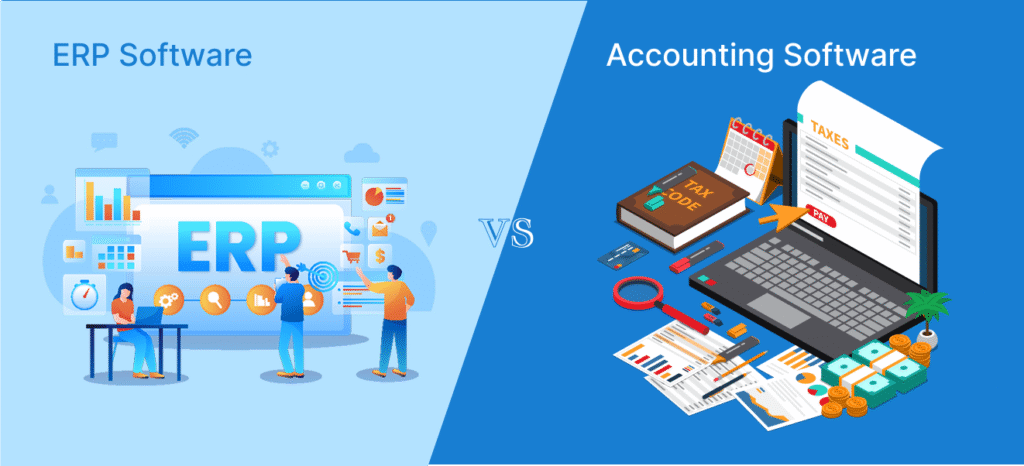
In the rapidly evolving business world, staying on top of operations and finances is crucial. Business owners often face a dilemma when choosing between ERP systems and accounting software. While both solutions help manage financial tasks, they serve different purposes and cater to varying levels of complexity within a business.
This blog aims to clarify the differences between ERP and accounting software, highlighting their unique features, benefits, and the scenarios in which one might be more appropriate than the other. By the end, you’ll have a clearer understanding of which solution is best suited for your business.
What is ERP Software?
ERP (Enterprise Resource Planning) software is a comprehensive business management solution that integrates various core functions across departments into a unified system. Instead of operating in silos, teams within an organization—like finance, HR, sales, procurement, and supply chain—can collaborate more effectively through a single platform.
Common Modules in ERP Software:
- Finance and Accounting: Budgeting, general ledger, invoicing, and financial reporting.
- Human Resources: Payroll, employee management, recruitment.
- Inventory Management: Stock levels, reorder alerts, warehouse tracking.
- Sales and CRM: Lead tracking, customer interaction, order management.
- Supply Chain Management: Procurement, vendor management, logistics.
An ERP system provides real-time data across departments, ensuring accurate reporting, improved decision-making, and increased operational efficiency.
What is Accounting Software?
Accounting software is a specialized application designed to manage and record a company’s financial transactions. It is primarily used by small to mid-sized businesses that require tools for basic financial tasks.
Typical Features of Accounting Software:
- Invoicing and Billing
- Accounts Payable and Receivable
- Bank Reconciliation
- Tax Preparation and Compliance
- Financial Reporting
Popular accounting software solutions include QuickBooks, Tally, and Zoho Books. These tools focus mainly on financial processes and lack the broader functionality of ERP systems.
Key Differences Between ERP and Accounting Software
Let’s break down how ERP systems and accounting software compare across key criteria:
-
Scope
- ERP:Covers the entire business ecosystem—from HR and sales to finance and logistics.
- Accounting Software:Limited to managing financial data and accounting activities.
- Features
- ERP:Offers modules for HR, CRM, inventory, supply chain, and more alongside financial tools.
- Accounting Software:Focuses only on core financial features like bookkeeping, tax reporting, and invoicing.
- Integration
- ERP:Designed for seamless integration with internal modules and external tools (e.g., eCommerce platforms, CRMs, payment gateways).
- Accounting Software:Often supports limited integrations, typically with banks or payroll providers.
- Scalability
- ERP:Highly scalable; supports business growth and can handle complex multi-location, multi-currency operations.
- Accounting Software:Better suited for small businesses; may require upgrades or migration as the business scales.
When to Choose ERP Software for Your Business
ERP systems are best for:
- Businesses experiencing rapid growth and operational complexity
- Organizations that need real-time data to support decision-making
- Firms managing supply chains, manufacturing, or multiple warehouses
your company struggles with data silos, inefficient workflows, or relies on multiple disconnected systems, ERP is the logical next step.
When to Choose Accounting Software Over ERP
Accounting software is ideal for:
- Startups and small businesses with limited financial operations
- Companies with straightforward accounting and tax filing needs
- Businesses without plans for immediate expansion
- Entrepreneurs or freelancers who need a cost-effective solution
Accounting software may suffice if you focus on managing day-to-day finances without the need for cross-functional integration.
Comparison Table: ERP System vs Accounting Software
| Feature | ERP Software | Accounting Software |
|---|---|---|
| Scope | Organization-wide | Finance-focused |
| Modules | Finance, HR, CRM, Inventory, etc. | Invoicing, Expense Tracking |
| Integration | High (internal + external systems) | Low to moderate |
| Customization | Highly customizable | Limited customization |
| Real-time Reporting | Yes | Basic to moderate |
| Scalability | High | Moderate |
| Cost | Higher investment, higher ROI | Lower upfront cost |
| Deployment | Cloud, On-Premise | Mostly Cloud-based |
| User Base | Cross-departmental | Finance team only |
Answering a Few FAQs
Conclusion
While accounting software is a great entry point for managing business finances, its functionality remains limited to the finance department. ERP systems, on the other hand, offer a holistic view of your entire business by integrating all departments into a single platform.
If your business is growing or operates with complex processes, ERP software is a strategic investment that enhances efficiency, transparency, and scalability.
Kyle Solutions specializes in building custom ERP systems tailored to your business needs. As an experienced ERP development firm, we help businesses across industries transition from basic tools to robust, integrated platforms that power smarter operations. Contact us today to discover how ERP can transform your organization.


